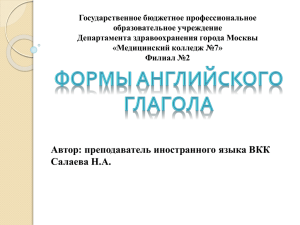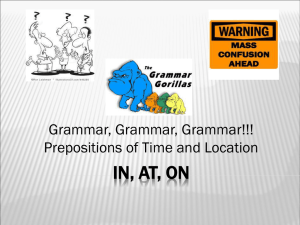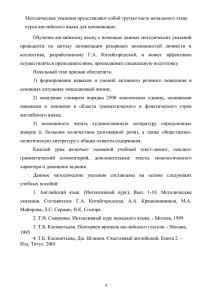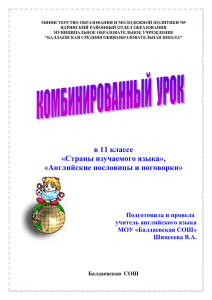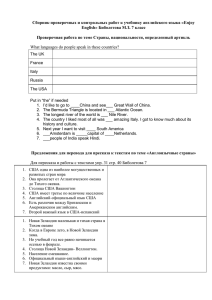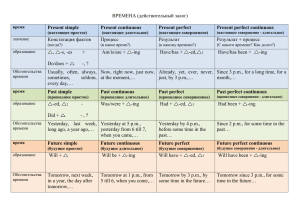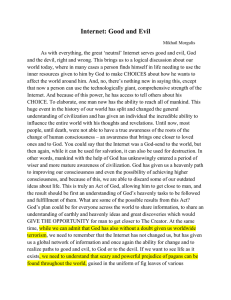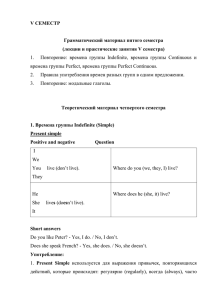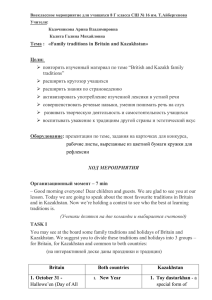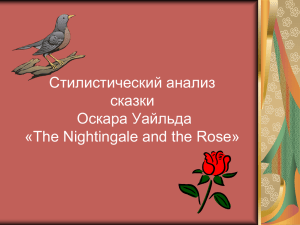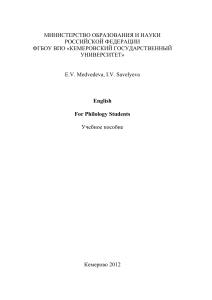Старший преподаватель кафедры иностранного языка ИЯСГТ ТПУ Аверкиева Любовь Генадьевна
advertisement
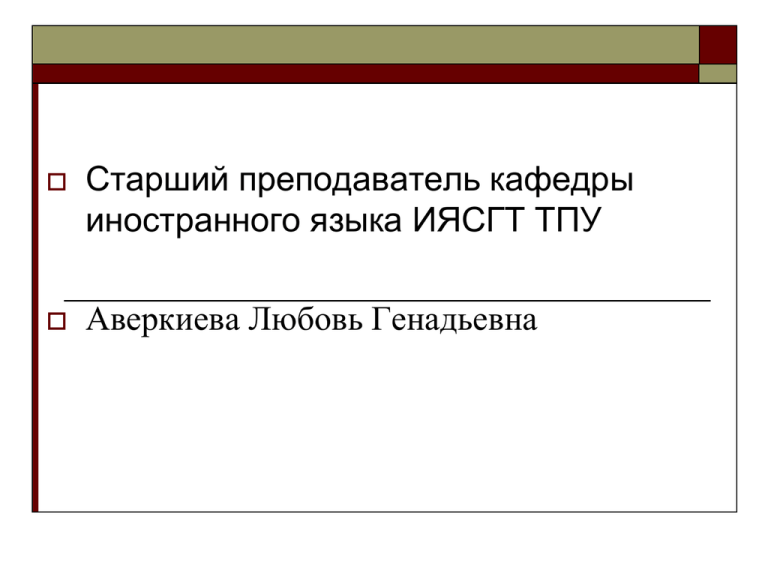
Старший преподаватель кафедры иностранного языка ИЯСГТ ТПУ Аверкиева Любовь Генадьевна ПЛАН Введение Учебное пособие Лексический материал по теме «Competition» Грамматика Введение «ТОМСКИЙ ПОЛИТЕХНИЧЕСКИЙ УНИВЕРСИТЕТ» А.Ю. Смирнова, Ю.А. Чайка АНГЛИЙСКИЙ ЯЗЫК Профессионально-ориентированный курс Рекомендовано в качестве учебного пособия Редакционно-издательским советом Томского политехнического университета Издательство Томского политехнического университета 2012 Учебное пособие Структура Глава 1 ИДЗ № 1(4 варианта) Глава 2 ИДЗ № 2 (4 варианта) Грамматический справочник Темы для изучения в осеннем семестре Unit 1. ECONOMY. COMPETITION. Unit 2. РRODUCTION. Грамматический материал Present Simple/Present Continuous Past Simple/Present Perfect Ways of expressing Future Gerund/Infinitive Degrees of comparison of adjectives Passive voice Prepositions of place Требования к экзамену экзамен Контрольные работы № 1,2 Итоговое тестирование Зачтено – 70% Зачтено – 60% Рейтинг-план КР №1 - 17-24 б. КР №2 - 16-24 б. РК – 12б. Экзамен - 22-40 б. Competition (keynotes) Developing a successful strategy is a vital part of the planning process for all business organizations. Analysing where a business stands in relation to its markets and competition enables it to identify potential opportunities for growth and potential threats. It is then possible to set strategic objectives and to predict the human and financial resources needed to achieve them. Основные понятия экономики Match the words with the definitions. 1. Population А an increase in amount, number or size 2. Area B something that is grown or made in a factory in large quantities 3. Growth C the number of people living in a particular area 4. Product D a particular part of a country, town, etc. Match the words with the definitions. 5. Firm F the system by which a country’s money and goods are produced and used 6. Export G selling and sending goods to other countries 7. Economy H the activity of trying to sell more and be more successful 8. Competition I a business or company, especially a small one The Future Simple Tense Образование will + инфинитив смыслового глагола без частицы to They will arrive tomorrow. I will meet you after work. The Future Simple Tense Утвердительная форма I We You He She It The will ask Вопросительная форма I we you Will he ask? she it they Отрицательная форма I We You He will not ask She It They The Future Simple Tense Употребление 1. Для выражения обычных действий в будущем: Don't worry I'll write every day. 2. Для выражения последовательных действий в будущем: He will ring you up and tell you everything. 3. Когда мы решили сделать что-либо в момент речи -I am short of money at the moment. – Oh, don't worry, I'll lend you some money. 4. Для выражения обещания или предложения: I'll post letters for you. 5. В ситуациях, когда мы говорим о том, в чем мы не уверены или когда делаем предположение после следующих выражений: I think I expect I'm sure I wonder probably When I leave college I'll (will) probably go abroad. In five years I expect I'll be married. Другие способы выражения будущего времени Оборот -to be going toБудущее намерение, спланированное до момента говорения I am going to stay at home. (= I've decided to do it.) They are not going to have a party. -There is a good film on television tonight. Are you going to watch it? -No, I’m too tired. I am going to have an early night. Будущее действие, которое должно произойти из-за сложившейся ситуации -Look at those black clouds! It's going to rain. -- Oh, I feel terrible. I think I'm going to be sick. Другие способы выражения будущего времени Оборот -to be going toФормы утвердительная: I am (She is, They are) going to leave soon. отрицательная: I am not (You are not, We are not) going to read. вопросительная: How long are you (is he, are they)going to stay? Упражнение Complete the sentences. Use going to + one of the verbs from the box. eat do give lie down stay walk wash watch wear 1. My hands are dirty. – I'm going to wash them. 2. What _______________ to the party tonight? 3. I don't want to go home by bus. I _______________. 4. John is going to London next week. He ___________ with some friends. 5. I'm hungry. I _______________ this sandwich. 6. It's Sharon's birthday next week. We _______________ her a present. 7. Sue says she's feeling very tired. She _______________ for an hour. 8. There's a good film on TV this evening. __________ you ________ it? 9. What _____________ Rachel _____________ when she leaves school? Другие способы выражения будущего времени Настоящее время глаголов для обозначения будущего времени The Present Continuous Tense - в значении будущего времени: Спланированное действие, которое точно произойдет в будущем He is playing tennis on Monday afternoon. He is having dinner with Ann on Friday. The Present Simple Tense - в значении будущего времени: Действия, которые происходят по расписанию The train arrives at 9 am. The film starts at 6 o'clock. Упражнение Complete the sentences using will or going to. "Why are you turning on the television?” “_____________ the news. (I/watch)" "Oh, I haven't got any money." "Well, don't worry. _____________ you some. (I/lend)" "Why are you filling that bucket with water?" "_____________ the car. (I/wash)" "Are you going shopping?" "Yes, _____________ something for dinner. (I/buy)" "What would you like to eat?" "_____________ a sandwich, please. (I/have)" "Did you post that letter for me?" "I'm sorry. I forgot. _____________ it now. (I/do)" "I've decided to repaint this room." "Oh, really? What colour _____________ it? (you/paint)" Упражнение Which is correct? 1. I can't meet you tomorrow afternoon. I'm playing / I 'll play tennis. 2. I meet /I'll meet you outside the hotel in half an hour, OK? 3. "I need some money." "OK, I’m lending / I’ll lend you some." 4. I'm having / I’ll have a party next Saturday. I hope you can come. 5. "Are you doing / will you do anything tomorrow evening?" "No, I'm free. Why?" 6. It's a secret between us. I promise I won't tell /I am not telling anybody. 7. "Did you phone Ruth?" "Oh, no. I phone / I’ll phone her now.“ 8. I think Jane will get / is getting the job. She has a lot of experience. 9. Ann isn't free on Saturday. She’ll work / she is working. Gerund/Infinitive Герундий (the Gerund) – это неличная форма глагола, герундий похож как на существительное, так и на глагол, так как по сути является промежуточной формой между ними. По форме герундий аналогичен причастию I, то есть образуется прибавлением к основе инфинитива суффикса -ing (writing, reading). В русском языке такой формы нет. Инфинитив – это базовая, неличная форма глагола. Признаком инфинитива в английскомя языке является частица to, например: (to)go, (to) be, (to) ask, (to) fight, (to) understand, (to) walk. Английский инфинитив сочетает в себе признаки глагола и в некоторой степени существительного. Gerund/Infinitive 1. В предложении герундий и инфинитив часто могут выполнять одну и ту же функцию, поэтому иногда бывает трудно решить, где нужно использовать герундий, а где – инфинитив. Как герундий, так и инфинитив могут выполнять в предложении функции подлежащего и предикатива. Однако в большинстве таких случаев намного предпочтительней использовать герундий, инфинитив в функциях подлежащего и предикатива используется крайне редко, особенно в современном английском. Learning is important. Учение важно. To learn is important. Учение важно. (Менее вероятный вариант.) The most important thing is learning. Самое важное это учиться. The most important thing is to learn. Самое важное это учиться. (Менее вероятный вариант.) Gerund/Infinitive 2. Несколько сложнее выбирать между герундием и инфинитивом в качестве дополнения и предикатива в предложении. Как правило, использование герундия или инфинитива зависит от смыслового глагола предложения. Некоторые глаголы требуют после себя герундий to admit – допускать, признавать, to avoid - избегать, to delay– откладывать, to deny – отрицать, отвергать, to dislike - не нравиться, to enjoy – наслаждаться, нравиться, to escape – убегать, to excuse – извинять(ся), to finish – закончить, to forgive – прощать, извинять, to imagine – воображать, to mention – упоминать, to mind – возражать (в вопросах и отрицаниях), to miss - упустить, to postpone - откладывать, to risk – рисковать, to stop - прекращать, to suggest – предлагать, to understand – понимать и др. She suggested going to a movie. Она предложила сходить посмотреть фильм. I don’t mind doing it for you. Я не возражаю сделать это для тебя. Gerund/Infinitive 3. Некоторые глаголы требуют после себя инфинитив to aim – стремиться, to afford – позволить себе (что-л), to agree – соглашаться, to appear – появляться, to decide – решать, to determine – определять, to demand – требовать, to expect – ожидать, to fail – терпеть неудачу, to let – позволять, to happen – произойти, to hope – надеяться, to intend – намереваться, to learn – учиться, узнавать, to mean – подразумевать, to offer – предлагать, to pretend – притворяться, to promise – обещать, to propose – предлагать, to seem – казаться, to try – попытаться, to want – хотеть, to wait (for) – ждать и др. I want you to come here. – Я хочу, чтобы ты пришел сюда. We waited for him to phone. – Мы ждали, что он позвонит. Make infinitives (add “to”) or gerunds (add “-ing”) of the verbs in brackets to make the following sentences grammatically correct. 1. 2. 3. 4. 5. 6. 7. When I’m tired, I enjoy ... television. It’s relaxing. (watch) It was a nice day, so we decided ... for a walk. (go) I’m not in a hurry. I don’t mind ... (wait) They don’t have much money. They can’t afford ... out very often. (go) We were hungry, so I suggested ... dinner early. (have) Hurry up! I don’t want to risk ... the train. (miss) I’m still looking for a job but I hope ... something soon. (find) Степени сравнения прилагательных Положительная big (большой) Сравнительная bigger Превосходная biggest Образование степеней сравнения прилагательных Сравнительная – Прил. в положит. степени + суффикс “-er” fast – faster (быстрый - быстрее) narrow – narrower (узкий – уже) Превосходная – Прил. в положит. степени + суффикс “-est” long –the longest (длинный – самый длинный). Образование степеней сравнения прилагательных 1. 2. 3. big большой - bigger - (the) biggest hot горячий - hotter - (the) hottest busy занятый - busier - (the) busiest happy счастливый -happier -(the) happiest simple простой – simpler – the simplest white белый - whiter – the whitest Образование степеней сравнения прилагательных Многосложные прилагательные: • interesting – more interesting – the most interesting; • difficult – more difficult – the most difficult It is the most interesting book I have ever read. Это самая интересная книга, какую я когда-либо читал. Образование степеней сравнения прилагательных Выражение меньшей и наименьшей степени: expensive - less expensive – the least expensive difficult – less difficult – the least difficult This text is less difficult than that one. Этот текст менее трудный, чем тот. This text is the least difficult of all. Этот текст наименее трудный из всех. Образование степеней сравнения прилагательных • • • • Исключения good/well - better - the best bad - worse - the worst little - less - the least many/much – more – the most This book is better. Your answer was worse than yesterday's. Упражнение Complete the sentences. Use a comparative. 1. 2. 3. 4. 5. 6. 7. Helen's car is not very big. She wants a bigger one. My job isn't very interesting. I want to do something ____. You are not very tall. Your brother is __________. My chair isn't very comfortable. Yours is _____________. Your plan isn't very good. My plan is ______________. My bag isn't very heavy. Your bag is ______________. London isn't very beautiful. Paris is _______________. Упражнение Complete the sentences with a superlative. 1. 2. 3. 4. 5. It's a very nice room. It's the nicest room in the hotel. It's a very cheap restaurant. It's __________ in the town. It was a very happy day. It was __________ in my life. She's a very intelligent student. She __________in the school. It's a very valuable painting. It _________ in the gallery. Упражнение Complete the sentences with the suitable form of the adjectives in the brackets. 1. 2. 3. 4. Which is _____________ (long) day of the year? Winter is _____________ (cold) season. In spring the days are _____________ (long) than in winter. It is _____________ (cold) today than it was yesterday. Спасибо за внимание!

